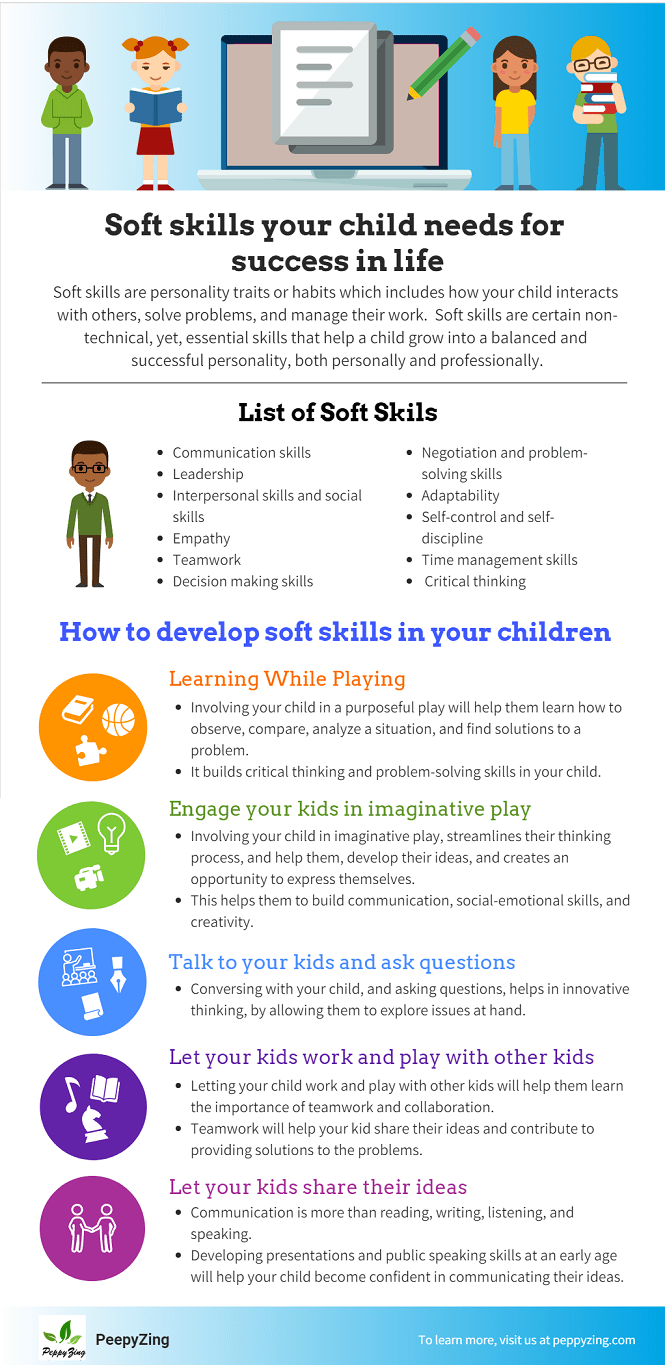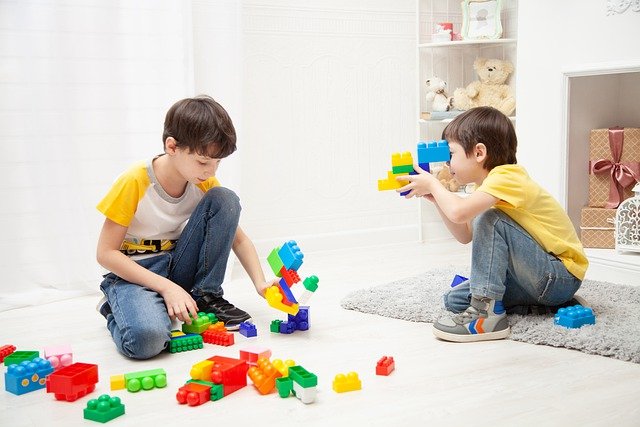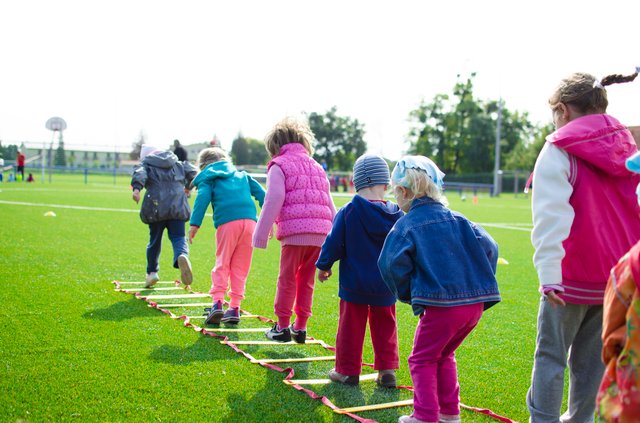
In the world of “technological advancement”, most parents, are in a chase to get their children, the best education and prepare them for a profitable career. However, in the process, they only focus on “hard skills” like, reading, writing, mathematical skills, and language proficiency, etc., and ignore the “soft skills”, which are equally important for their child’s success.
“Take advantage of every opportunity to practice your communication skills so that when important occasions arise, you will have the gift, the style, the sharpness, the clarity, and the emotions to affect other people.” – Jim Rohn, entrepreneur.
What are soft skills
Soft skills are certain non-technical, yet, essential skills that help your child grow into a balanced and successful personality, both personally and professionally. Soft skills are personality traits or habits which includes how your child interacts with others, solve problems, manage their work, and much more. It applies to all life situations and career prospects.
Why soft skills are important
While education and technical knowledge are essential for your child’s success, soft skills are as important to make them stand out from others.
Deloitte states that technical skills and formal qualifications are only part of the requirements for employees. ‘Soft skills and personal attributes are equally important for success.
Moreover, the best part is, that these employability skills and enterprise skills are transferable, which makes you adaptable across different situations and occupations.

Share this Image On Your Site
Soft skills vs Hard skills
‘Hard skills’ are related to the technical knowledge and training required for a particular job. Hard skills are measurable abilities like, reading, writing, and calculating abilities, and are learned through formal education.
On the contrary, ‘soft skills’ are not specific to a job or an industry, yet crucial to your child’s success both professionally and personally. It is not something that your child is taught in the classroom. These are acquired purely by practice and experience.
List of soft skills
Here are some examples of soft skills on which you, should concentrate on building it in your child.
- Communication skills
- Leadership
- Interpersonal skills and social skills
- Empathy
- Teamwork
- Critical thinking
- Negotiation and problem-solving skills
- Adaptability
- Self-control and self-discipline
- Time management skills
- Decision-making skills
How to develop soft skills in your children
Most jobs require these unique set of skills, which will not only ensure better career prospects for your child, but also success in their all other endeavors.
Experts believe, and suggest, that you must teach these skills to your children so that they learn and perform their best to their abilities.
Here are a few ways in which you can do so.
1. Learning while playing

Your child’s mind is like a sponge and can soak up the knowledge both consciously and subconsciously and that too at a faster rate.
In today’s scenario, simply rote learning and memory work is not a practical approach to learning. Involving your child in a purposeful play will help them learn how to observe, compare, analyze a situation, and find solutions to a problem. Activities and fun games, as simple as jigsaw puzzles, will help your child think about different sides of an issue, evaluate them, and make decisions.
Taking a practical example of it, like, what would your child do if there is a sudden power cut, or what should they do if there is a stranger outside their door, and they are all alone at home.
In such situations, with these skills, your child will be more likely to search for alternative solutions.
Your kids need to learn while playing, as it builds critical thinking and problem-solving skills in your child.
2. Engage your kids in imaginative play
There is no limit to a child’s imagination. Imagination plays a crucial part in a child’s cognitive and social development.
Involving your child in imaginative play, streamlines their thinking process, and help them, develop their ideas, and creates an opportunity to express themselves. This helps them to build communication, social-emotional skills, and creativity, as they can express their individuality through their ideas. Also, encourage them to read books. This will also help in building their imagination. Check out these fabulous books for your kids.
3. Talk to them and ask questions
Conversing with your child, and asking questions, helps in innovative thinking, by allowing them to explore issues at hand.
Encourage your child to innovate by asking probing questions, like “What makes birds fly?” or “What if they could speak to animals?” This will help your child to come up with innovative ideas of their own, and solutions to a particular problem.
4. Let your kids work and play with other kids

Letting your child work and play with other kids will help them learn the importance of teamwork and collaboration. It will develop in them the team spirit and, also, teach them that success is achieved through every individual’s effort.
As parents, you can engage your child in a collaborative activity or project like solving a puzzle or building a domino pattern together.
Teamwork will help your kid share their ideas and contribute to providing solutions to the problems.
5. Let your kids share their ideas
Communication is more than reading, writing, listening, and speaking. Your child may come across many situations, when they are grown up, where they will be required to meet, present, and persuade people, at their workplace.
Developing presentations and public speaking skills at an early age will help your child become confident in communicating their ideas to others in a comprehensible manner.
6. Teach them Self-control
It is not easy for kids to show patience and self-control. It doesn’t come easy for kids to learn ‘no’ as ‘no’. Even sharing and letting other children play with their toys, is difficult for some kids, and they may end up throwing tantrums.
Start your child teaching self-control at a young age. Let your child mingle and play with other kids. Eventually, they will realize, that the other children are not going to take away their favorite toy. Hence, this will help your child learn sharing and self-control.
7. Feeling good about themselves

Never fail to praise your child for good behavior and showing manners and etiquettes.
Do not measure your child’s abilities with their grades. If they do not perform well, do not make a big deal about it. Instead, boost their self-esteem by telling them that “it happens” and they can do it better next time.
Get yourself involved in an adventure like camping, biking, etc, with your kids, to build their self-esteem and boost their confidence.
8. It is normal to make mistakes
You must let your child understand, that it is okay to make mistakes and seek help in times of trouble. This will help them manage their stress and regulate their emotions, building the ability to be flexible and adaptable, according to the situation.
While your child might not have developed the ability to express their fears yet, you can teach them how to work through it.
As a parent, you need to be honest with your child and help them develop the confidence to face their fears and take responsibility for their actions. This will strengthen your child’s ability to be prepared to face the challenges in the future.
Conclusion
While these soft skills are not taught in the classroom, you can teach them these essential skills by incorporating them into your daily life.
Soft skills are critical for parents as well. With soft skills like patience, positivity, empathy, compassion, pragmatism, communication, and confidence, you can prepare your child to face the challenges of life.
Be open and communicative with your child, so that they understand what is good for them. Give your child time and space to discover and learn new things on their own. Always, stand by them and help them evolve into a refined, balanced, and responsible person inside out.
Krishna is a Management graduate in Human Resource. She is an avid reader, knowledge seeker, and an adoring mother of two lovely kids.